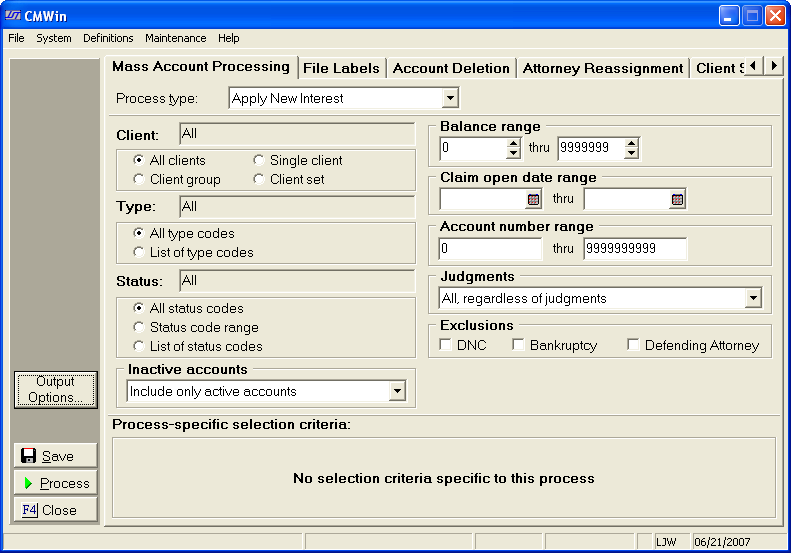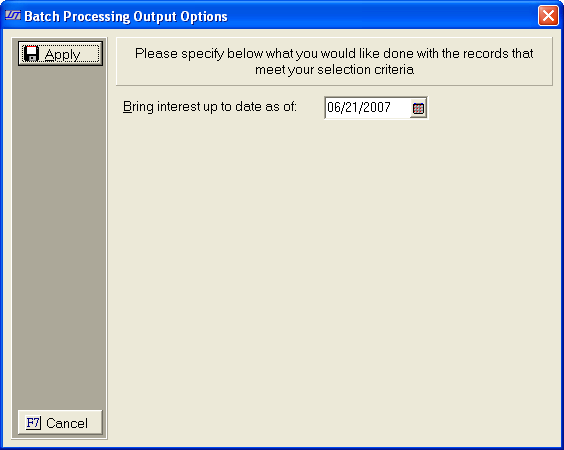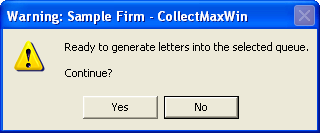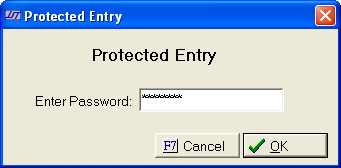 button. The
button. The
The Apply New Interest batch process will allow you to post interest on a group of accounts/claims. Use the selection criteria to narrow the group of claims to apply new interest. Otherwise, all claims for all debtors and clients will be eligible for applying new interest.
From the
main screen of CollectMax, click the  button. The
button. The
![]() screen will be displayed.
screen will be displayed.

Select the
![]() by clicking the
by clicking the  button and picking Apply New Interest
from the list.
button and picking Apply New Interest
from the list.
You will need to select from the following criteria to get the correct group of accounts for your batch process.
Select a single client, a group of clients or all clients.

Click the radio button next to your selection.
Select all type codes, a single type code or pick more than one type code from the list of codes.

Click the
 button next to your selection.
button next to your selection.
Select a single status, a range of status', or all status codes.

Click the
 button next to your selection.
button next to your selection.
Hint: If you only want open accounts for you batch process, select a status range from the first status in the list to the last open status in the list.
Select a
balance range by typing in the balance fields. You
may also use the ![]() buttons to click to the balance you want.
Clicking
the up arrow will increase the balance and clicking the down arrow will
decrease the balance.
buttons to click to the balance you want.
Clicking
the up arrow will increase the balance and clicking the down arrow will
decrease the balance.

Hint: To select all balances, set or leave the balances at 0 thru 9999999.
Select an
open date range. You
can type the date in each field with the MM/DD/YYYY
format or click the ![]() button and select the date.
button and select the date.

Hint: To select all open dates, leave the date fields empty
Select an account number range. Type in the account numbers in the fields.

Select accounts
according to judgments. You
can exclude or include only accounts with judgments or pick all no matter
if they have a judgment. Click
the ![]() button and pick from the list.
button and pick from the list.

Select the
accounts you would like to exclude. By
clicking the ![]() box you can exclude accounts for the following
reasons.
box you can exclude accounts for the following
reasons.
![]()
Hint: Remember only accounts that fall into these specific criteria will be selected for the batch process. If an account is missing from the batch, review the account to make sure it fits within the criteria you set .
Select to include account based on active or inactive status.

For the ability to automate this batch process, see Batch Process Automation Script , a Version 7 Feature.
Select the
interest options, by clicking the ![]() button.
button.
The options box will appear.

Select the
date you would like to post through by typing in the date field with the
MM/DD/YYYY
format or clicking the ![]() button and selecting the date.
button and selecting the date.
Next, select
the ![]() button to save these options and continue with the
batch process.
button to save these options and continue with the
batch process.
Once the
you have selected the criteria you need. Click
the
 button.
button.
If you have forgotten to select the ![]() button, the options screen will appear and prompt you to
make the selections. Then
click the
button, the options screen will appear and prompt you to
make the selections. Then
click the ![]() button to restart the process.
button to restart the process.
A preview report will print listing the accounts that have been selected for the batch and the action to be taken on these accounts.

Please review these accounts. Click the X to exit the preview. A box will appear asking you if you would like to make permanent changes to the database.

If the preview report was correct, click
the ![]() button to continue.
button to continue.
If not, click the ![]() button to
end the process and correct your selection criteria and re-process.
button to
end the process and correct your selection criteria and re-process.
If you chose to continue, you will be prompted to enter the master password.

Type the password in the field and click
the  button. You
may also cancel the process at this time by clicking the
button. You
may also cancel the process at this time by clicking the ![]() button.
button.
A window will appear recommending a snapshot. JST recommends a snapshot be performed before making any changes to the database.

Click the ![]() button to exit the
batch process and perform a snapshot.
button to exit the
batch process and perform a snapshot.
Click the ![]() button to continue
with the batch process.
button to continue
with the batch process.
The process will begin making the changes. After they are complete a final
report will be created. You may print this report or click the X to exit the report.

Once you have exited the final report. The
batch process is complete. Click
the  button to exit to the main screen.
button to exit to the main screen.
Check the claim tab of a selected debtor's account to verify the process completed correctly. If not, notify JST Technical Support.